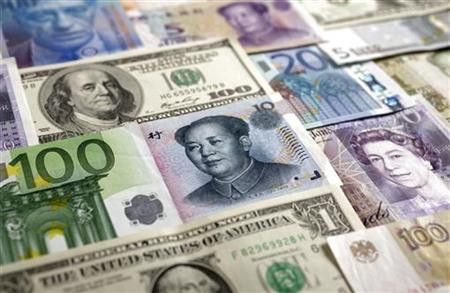Central Banks Watch: ECB, BoE, RBA, Malaysia, Poland, Thailand and Romania to Set Rates, Poloz, Kuroda and Bernanke to Speak
Policy statements seen as signiciant, after dollar and sterling's long low runs

After an eventful central bank month of October, the first week of November will see rate decisions in Eurozone, UK and Australia, while a long list of speakers will be led by Bank of Japan govenor Haruhiko Kuroda, European Central Bank govenor Mario Draghi, Bank of Canada govenor Stephen Poloz, and the former Fed chairman Ben Bernanke.
From the emerging world, Romania, Thailand, Malaysia and Poland are scheduled to set rates in the upcoming week.
The market will be keen to watch the response of the rest of the world to last month's diverging policy rate indications from the world's most influential central banks: the Federal Reserve and the Bank of Japan (BoJ).
By ending the quantitative easing on schedule in October, the Fed fell in line with market expectations and its own projections, but the actual event did impact the forex market by pushing the dollar to new highs.
However, the BoJ's move to further stimulate Japan's economy was not expected, and that helped risk assets rally globally while the relative fall in the yen added to the dollar strength.
Now another set of major central banks, the European Central Bank (ECB), Bank of England (BoE) and Reserve Bank of Australia (RBA), have the opportunity to set their stance in response to the world of tighter dollar and cheaper yen.
G10 Rates
Analysts expect no changes in the main rates in Eurozone, the UK nor Australia this week, but their statements will be of special importance this time against the backdrop of the latest Fed and BoJ moves.
RBA will announce its policy on 4 November. The main cash rate in Australia is 2.5%, the record low it reached more than a year ago. It was at 4.75% before starting the latest easing cycle in late 2011.
The BoE's policy bias has been relatively hawkish for the past several months, while the ECB is still battling a weak recovery in the economy.
With the euro and pound trading near new multi-month lows, the policy statement by these major central banks will be significant.
As usual, the BoE Monetary Policy Commitee's minutes, due two weeks later, will be of even more importance, given the likelihood of a surprise in the voting pattern, as it has been the case over the past few months.
From ECB, the post-announcement press conference could have more impact on the market than the policy announcement itself, making it a key item on the economic calendar.
Emerging Market Rates
Policy surprises from the G10 world is very rare but the case is different for most of the emerging market economies, given their fragility and vulnerability to external and internal shocks.
The Central Bank of Russia surprised markets with a 150 basis points hike in its main rate, taking it to 9.5% last week, while Banco Central do Brasil's 25 basis point increase in the Selic rate, took it to 11.5%.
The National Bank of Poland, due to set rates on 5 November, had cut the benchmark base rate to 2% in the 8 October decision, citing slowing growth. The consensus for this month is another 25 basis points reduction to 1.75%.
Thailand and Malaysia are scheduled to announce rates on Wednesday and Thursday respectively. The former has been keeping its rates steady at 2% for a while now but the latter had surprised in July with a 25 basis points hike in the main rate to 3.25%.
Romania's central bank – Banca Naţională a României – will announce monetary policy on Tuesday and the market will be watching for a cut in the main rate from the current 3%.
Romania has been on an easing cycle since July last year when the policy rate was 5%. It saw a cut in the last meeting too, which was in September.
Speakers
The Bank of Canada's Poloz will come in the press on 3 November, while Kuroda and Bernanke are scheduled to speak on 5 November. ECB president Draghi will address the media in the post-policy briefing on Thursday.
A host of regional Fed officials are also scheduled to speak at various occasions through the week, and in the aftermath of the great October 2014 central bank calendar, their remarks could most likely contain elements of interest to the market.
© Copyright IBTimes 2025. All rights reserved.






















